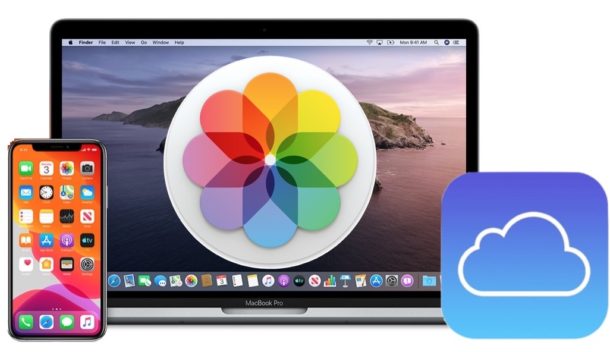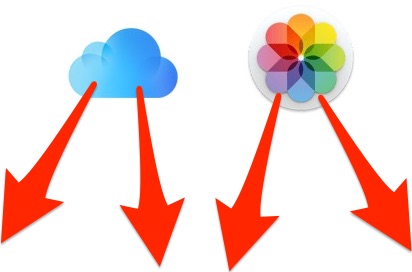How to Setup & Use iCloud Photos on Mac

Want to use iCloud Photos on Mac? In its simplest form iCloud Photos is a sync service that makes sure your iPhone, iPad, Apple Watch, Apple TV, and Mac all have every photo you’ve taken, all ready at a moment’s notice. That means you can access the photos from any other device with the feature turned on, so you’ll want to be sure you enable iCloud Photos on iPhone or iPad and you can even enable and use a Windows PC for accessing iCloud Photos, too. It’s incredibly convenient when it works as intended, but you’ll need to activate it before any of that can happen.
This guide is going to run you through the steps needed to get iCloud Photos up and running on your Mac. It isn’t a complicated process, but like everything else, it’s only easy if you know how to do it.
How to Enable iCloud Photos on Mac
Let’s get started enabling iCloud Photos on Mac:
- Click the Apple logo in the top-left corner of the screen, and then click “System Preferences.” from the dropdown menu
- Click “Apple ID.” from system preferences

- Find ‘iCloud” in the sidebar and click it.
- Check the mark next to “Photos” to enable iCloud Photos.

- Launch Photos app when finished to see iCloud Photos syncing in progress, once complete all iCloud Photos will appear in the Photos app on Mac (and other devices it’s enabled on too)
That’s all there is to it, iCloud Photos is now enabled on the Mac. The initial syncing process may take a while depending on your media library, so keep the Mac (and iPhone or other devices) turned on and plugged in. You may find that leaving them on overnight is a good way too make sure everything is synced properly to iCloud Photos initially.
Now when you open the Photos app it will use iCloud Photos to sync all of your photos to the cloud.
![]()
And yes, iCloud Photos will also sync any videos and movies that are contained in the Photos apps on Mac, iPhone, and iPad.
This guide assumes you’re using macOS Catalina or later. With earlier versions of MacOS the steps are basically the same but go to the ‘iCloud’ preference panel instead to enable iCloud Photos.
Some General iCloud Photos Advice
This may be obvious, but iCloud Photos is best used when it’s enabled on all of your Apple devices, so you’ll want to be sure to enable iCloud Photos on iOS and iPadOS too so that photos sync to and from any of your other iPhone, iPad, and the Mac.
Once you have all of your photos in iCloud Photos, you can access them from anywhere with iCloud.com as long as you have a computer and an internet connection. And yes, even if you have to use a Windows PC you can access iCloud Photos too.
Additionally, iCloud Photos performs best on a reliable high speed broadband internet connection, as it transfers a lot of data between your Mac, iPhone, iPad, and any other devices using the same Apple ID. Therefore if you have a slow or unreliable internet connection, you may not want to use iCloud Photos at all as it can be frustrating or too slow to be practical.
Note that the larger the photos libraries are on the Mac, iPhone, iPad, and other devices, the longer the initial iCloud Photos syncing process can take. Therefore it’s best to make sure your devices are connected to the internet and on a high speed connection so that everything syncs, uploads, and downloads as intended.
Finally, you may want to upgrade iCloud storage capacity if you have a very large photos library, so don’t skip that particularly if you see any storage capacity problems with iCloud.

On a somewhat related note, some users discover that large photos libraries can cause some speed issues. Fortunately this is usually temporary and once Photos app has run its course and synced everything between iCloud and all devices and the Mac it should resolve on its own. Nonetheless if you find that your Mac isn’t performing properly and Activity Monitor points to “Photos Agent,” you might want to take a take a look at this for how to deal with Photos Agent for that particular issue if it persists, which basically means disabling iCloud Photos.
Apple is without a doubt a master of making the best of having control over every part of the user experience. It makes the software that runs on the devices it designs, and it builds the hardware it all runs on. It also handles the back-end services that the software and hardware use. And while there are occasional hiccups, it generally works well considering the scale Apple has to work with. And iCloud Photos – previously known as iCloud Photo Library – is a great example of that.
Do you use iCloud Photos on Mac? Do you like to use iCloud Photos to sync photos between Mac and your iPhone and iPad too? Let us know your experiences and thoughts in the comments.




Interestingly enough, I found this when trying to figure out how to limit or stop iCloud Photos syncing to Mac OS 11 Big Sur. My Mac was going through disk space, and running out (500GB SSD). So I set View Options in Finder to Calculate All Sizes, and then I found the culprit to be my 347.65GB Photos library sync’d from iCloud!
I do not want that 347.65GB allocating my 500GB disk. From a content perspective – for Photos, videos, etc, I want to use a Cloud as a Cloud – a place to archive infrequently accessed data that can be accessed dynamically when there is a web connection. I do not want to use it as a simple mirror source for local access.
There is no addressability of “Albums” in Photos, it is all or nothing in the Photos app regarding what is sync’d to iCloud. There is “Download Originals to this Mac” – which is what I had selected. Then there is “Optimize Mac Storage”.
So for someone outdoorsy like me who has a lot of photo and video content from various excursions… I’m going to see how Optimize Mac Storage goes. I wish I could choose to sync only the albums I select. THAT would be perfect.
When I try to check the mark next to photos I get “checking Library” spinning wheel. I have tried restoring/fixing Photo library but no change. Any suggestions?
This may sound ridiculous, but my iCloud on my Mac says I have 1774 videos there, however I can not find ANY videos nor photos on my MAC, even though the setting is enabled. I find them only on the iPhone.
This morning i received the “iCloud photos full” message when yesterday i had 2.56 in iCloud storage. something happened were the iPhone switched to iCloud were that is now enabled. while un-enabling iCloud-photos a warning said i would lose all my photos “ON MY PHONE” which never was the case. is this weird?
Did apple enable my photos on my phone to iCloud??
everything is backed up on the macbook air
(apple user since 1995)
If I use iCloud for photo storage do I still need the photos stored on my Mac Pro? I have a document called iPhotolibrary.Migratedphotolibrary that’s 33GB that is using valuable space on my Pro.
Yes it’s better to think of iCloud Photos as syncing than cloud storage. The way iCloud Photos works is it syncs all photos everywhere using it, so it stores all the photos on every device, which is why I personally find it goofy as it consumes tons of storage on all devices rather than just one. Dropbox, Google Photos, and some other cloud providers have options to not do that. I wish Apple gave the option.
A quick question
I’ve been using iCloud for ages with photos but now my phone is starting to get pretty full
If I delete a pic from my phone it deletes it from all devices and iCloud. Is it possible to retain the copy on iCloud but not on my iPhone????
The inability to selectively delete photos from an individual device without deleting it from iCloud is a serious problem with Photos, and the work-around is bad – you have to turn off iCloud on your device (per Apple Support, just checked 5/2/20) and then delete the photos. But I think if you turn iCloud back on, everything resyncs, including your deleted photos. Anybody know anything different?
This is a serious problem with Photos. You have to log out of iCloud.
I understand a lot of people really like iCloud but I do not.
It would be nice if you would publish an article for people like me who would like to disconnect iCloud from all of their devices. Everything I read is how to use it whereas I just want to get rid of it.
You can choose to not use iCloud, but you’ll still need an Apple ID (which is a simple iCloud account) for using things like iMessages, FaceTime, Calendar and contact syncing, etc.
The sync through iCloud is amazing.
I notice a strange issue sometimes. After taking a photo on iPhone, I see the new picture on Mac, just as it should.
Then, when I try to access the photo through Mac’s Share Sheet within an app, the new photo doesn’t appear even though it’s visible within photos. Eventually it shows up, but the delay can be significant and frustrating.
Any idea why this is happening?
Maybe I missed it, but I didn’t notice the warning that “deleting any photos from any connected device will delete them from all devices enabled. It is one of the universal truths, but it pays to remind everyone when you suggest they put their photos in the iCloud.
Just curious but I thought that iCloud Photo limited the number of photos stored in the cloud to 1,000. Older photos would roll off as new ones were added. Did that change or is that just applicable to the 5GB of free storage?
I tried logging in but could not find “Oliver Haslem” on the photo program.
It will be whatever your name is in System Preferences, if you’re in Catalina or later.
If you’re in Mojave or earlier it will be in the iCloud system preferences, and then you’ll see your name.
Oliver is the name of the author of this article, unless you’re on his computer you should not see his name on yours.